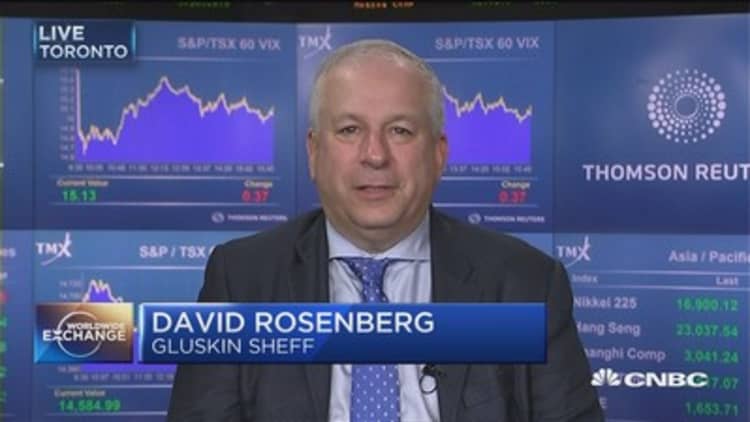As baseball fans look to Game 2 of the World Series on Wednesday night, investing fans may be in the late innings of their own game.
David Rosenberg, chief economist and strategist at Gluskin Sheff, believes both the bull market and economic recovery are nearing an end, winding down though not at the point yet of becoming completely undone.
"Most of the patterns, both in the realm of financial assets and the real economy, are flashing this signal — one of a very mature market," Rosenberg wrote Wednesday in his daily note to clients. "Now I am not sure if this is the seventh inning, or the ninth, it is likely somewhere in between."
For investors, that means reducing risk. While Rosenberg doesn't see an imminent collapse coming like the financial crisis in 2008, he does believe the focus should be on preserving capital rather than focusing on returns.
"Having cash on hand, reducing the beta of the portfolio, focusing on the running yield, and stepping up in quality across the capital structure are all going to pay off in terms of preserving capital, generating decent mid-single digit net returns at the very least, with a view towards allocating the dry powder at better price levels that will allow for a return to high-single digit or even double-digit returns once the dust settles," he said.

Long one of Wall Street's most-noted bears, Rosenberg turned bullish about five years ago as the U.S. escaped the shackles of the financial crisis and the bull market kept chugging along. Lately, though, he's become at least a skeptic, worried that multiple signs are pointing to a slowdown:
- The yield curve is flattening as economic data weakens.
- Tight credit spreads and low capitalization rates are showing the real estate sector's cycle is in its own late stages.
- Valuation metrics for stocks are around 2007 peaks before that bull market ended.
- The recent surge in corporate deals is typical of peak levels not seen since 1999, just before the dot-com bubble popped.
- Consumer confidence, while elevated, is declining.
- Business condition surveys are sliding.
- Bullish sentiment in the market is dwarfing the bearish side, a contrarian side that stocks are losing steam.
Rosenberg worries that at a time when growth appears to be sputtering, the Fed is contemplating a rate hike. The U.S. central bank last increased its rate target in December 2015, the only tightening since June 2006. Traders currently assign a 74 percent chance that the Fed will raise again in December.
"We'll see how brave the Fed will be — we know what happened last year after the Fed went and for two or three months, it wasn't a pretty picture," he said.
To be sure, some of the economic indicators have been improving after a lackluster first half that saw gross domestic product average just a 1.1 percent gain. Several Wall Street economists upped their third-quarter growth expectations after economic data showed positive surprises Wednesday. Notably, the U.S. trade deficit was smaller than expected and inventories grew.
However, the Atlanta Fed has been cutting its Q3 expectations steadily, most recently projecting 2 percent growth, a steep cut from a peak of 3.6 percent in August. However, that number hasn't been updated since Oct. 19. CNBC's Rapid Update tracker now expects the quarter to show 3 percent growth when the first GDP estimate comes out Friday.
Stocks, meanwhile, have held up, with the up about 4.8 percent for the year, though trading in a pretty right range since July.
Rosenberg said the signals are showing that growth is "late in the game."
"That is precisely where we are," he said. "And it's not even an opinion anymore. It is a market fact."


